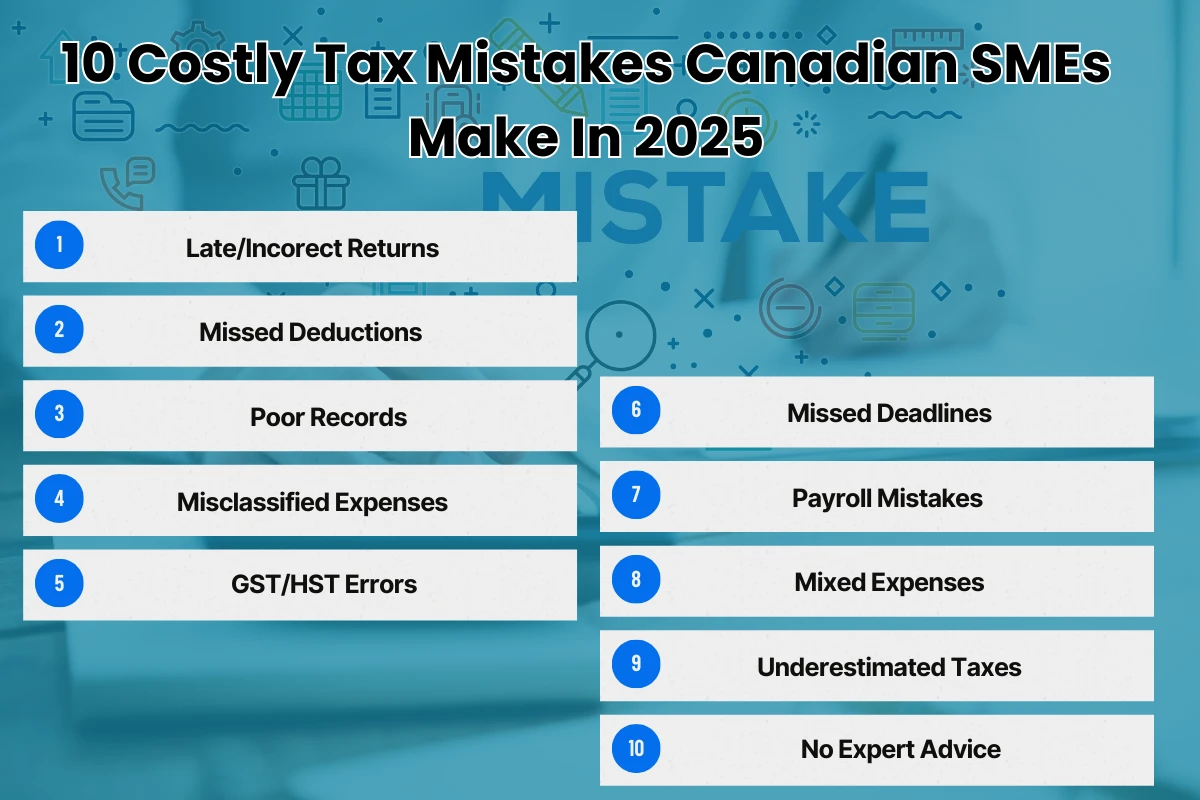
GET A FREE CONSULTATION TODAY!
Fill in the details, and our experts will contact you.
In 2025, the Canadian SME sector is more vibrant than ever, with Gen Z and Millennial entrepreneurs leading the way in driving innovation across various industries, as exemplified by Toronto fashion startup companies in e-commerce clothing and sustainable food applications in Vancouver. Statistics Canada estimates that SMEs comprise 98.1% of all companies in the country; thus, they are the pillars of the national economy. However, this rise in growth also comes with greater responsibility, particularly in the area of tax compliance in Canada.
Tax requirements have recently been tightened in Canada, with the Canada Revenue Agency (CRA) now employing a digital-first strategy to track business activity. This implies that late tax filings, reporting inaccurate GST/HST, or incomplete records may result in penalties, interest charges, or even a CRA audit. Most small business owners assume that taxation is simple. Still, it is not until they decide to sell products across different provinces or even internationally that they realize the intricacies of tax requirements.
Nowadays, small business accounting services in Canada are no longer an option, as entrepreneurs interested in scaling can no longer operate without them. Whether it's addressing changing CRA tax requirements, maximizing deductions, or staying up-to-date with GST/HST rules, professional assistance keeps one current and avoids non-compliance; time is saved and can be directed towards the growth process. In the modern world of competition, it is no longer possible to ignore taxes as a punishment; they are a crucial part of a business plan for sustainability.

There is a rapidly changing environment for taxes on small businesses in Canada, influenced by technological advancements, globalization, and changes in provincial policy. The Canadian audit, conducted by the CRA, has become increasingly digital-forward, with electronic records being submitted, risk being assessed using artificial intelligence, and stricter regulations on document retention. This transformation requires SMEs to utilize contemporary bookkeeping systems to be under audit throughout the year.
The second significant consideration is the difficulty of GST/HST reporting in Canada, primarily due to the business's online selling activities or its operations across multiple provinces. On the one hand, platforms such as Shopify and Amazon make it less complicated to become global. Still, on the other hand, they have imposed additional e-commerce tax requirements, Such as cross-border reporting in the U.S. and international sales.
There is the added difficulty of provincial tax compliance. A company that grows from Alberta to Quebec or British Columbia would have to adapt to varying rates, credits, and procedures for filing. In the absence of professional oversight, such differences may lead to costly errors. Proactive management of Canadian small business taxes in all jurisdictions in 2025 will be one of the essential factors in the successful performance of SMEs, and that is why professional accounting services may be helpful and crucial.
Most small business owners start with a single bank account, and not maintaining separate business accounts can leave one in disarray during tax season in Canada. By erasing the distinction between personal and business purchases, it becomes more challenging to keep track of deductions and comply with CRA expenses. This may result in audits or claim denials over time.
Accountant’s Fix: Open a dedicated business bank account and business credit card, and adhere to small business bookkeeping tips to keep an accurate account of transactions using the accounting software.
In Canada, as soon as your annual revenue reaches the CRA GST threshold of $30,000, the requirement to register for GST/HST registration is necessitated. Most SMEs overlook filing schedules or underestimate the reporting interval, which can result in late fees and penalties. Deadlines in CRA filing depend on the reporting cycle assigned to you.
Accountant’s Fix: Automate reminders, monitor sales on a real-time basis and allow your accountant to take care of timely filings, so that you do not miss a single deadline because of this.
The number of entrepreneurs who are unworthy of maximizing small business tax deductions in Canada is high. There are expenses, such as marketing, travel, software, and the home office deduction, that can significantly reduce Canadian taxable income. Failing to claim CRA business expenses that one is eligible for also means paying the tax that one should pay.
Accountant’s Fix: Get a tax specialist to help you go over all expenditures every year and make sure you take every tax deduction you can under Canadian tax laws.
The emergence of Shopify and Etsy has led to new compliance issues. With Shopify tax compliance in Canada, there must be an accurate ability to charge GST/HST based on the customer's location. Additionally, with Etsy seller tax compliance in Canada, international reporting may be required. Due to the failure to comply with cross-border taxation regulations in Canada, both domestic and foreign governments may impose penalties.
Accountant Fix: Set the online store's comparable tax settings and leave multi-province and international sales reporting to your accountant.
All transactions are now required to be recorded in CRA digital records, as per the CRA. A modern audit will not be passed with paper receipts. The consequence of not having cloud accounting in Canada is that businesses lose essential documents and fail to meet compliance checks.
Accountant’s Fix: Download bookkeeping software in Canada, where your digital copies of receipts, invoices, and contracts will be stored in a safe, CRA-compliant format.
Misclassification of workers as independent contractors to avoid payroll expenses goes against the contractor vs employee CRA regulations. This may result in the backdating of taxation, penalties, and fines for failure to comply with payroll compliance requirements in Canada.
Accountant’s Fix: If you have an accountant, familiarize yourself with your tasks and review them with them so that they are correctly classified and meet the requirements of the tax gig economy in Canada.
The establishment of CRA installment payments requires SMEs that consistently meet the deficiency amount above the $3,000 minimum year after year. Believing that quarterly payments are not required in Canada can result in insufficient cash flow and incur interest fees. This is something that most upcoming entrepreneurs fail to accommodate in their budget.
Provincial tax rates and filing requirements vary by province. Provincial tax rates in Canada vary widely, with Quebec requiring separate filings with Revenue Québec for business tax, while Alberta offers lower rates for small businesses. This does not account for these differences and risks of being underpaid or penalized.
Accountant’s Fix: Just pay your accountant to research and maintain compliance in every province where you have a store, and you don't see any expensive oversights.
Although preparing your taxes yourself may appear to be a less expensive alternative, it often results in DIY tax risks in Canada, including forfeited deductions, improper reporting, and CRA charges. Small business owners usually lack the expertise necessary to prepare complex tax returns for their businesses.
Accountant’s Fix: Hire a Canadian accountant to be precise in deductions, maximize deductions and stay within the prescribed limits of CRA.
A CRA audit in Canada may occur either randomly or due to red flags in the filings. Until Canada has adequate audit-ready records, businesses will be delayed, stressed, and may suffer penalties.
Accountant’s Fix: Establish a routine review of tax compliance in Canada with your accountant to stay on top of tax records throughout the year, keeping them well-organized and easily accessible.
Tax compliance in Canada is not only about avoiding penalties for Canadian SMEs, but also an essential factor in the scalability and stability of their finances. In the rapidly changing economy of 2025, where entrepreneurship is focused on Millennials and Generation Z, compliance will establish stability upon which growth can thrive. Correct tax planning in Canada enables companies to easily reinvest profits and find the necessary funds for expansion into other markets without being retroactively subjected to taxation.
Integrating compliance into the work plan is beneficial for younger business owners who value agility and digital-first options. With cloud-based accounting, automated GST/HST reminders, and data-driven forecasting, compliance becomes less of a burden and more of a catalyst for growth in small businesses across Canada.
For startups and high-growth businesses, collaboration with a startup accountant in Canada involves integrating technologically empowered tools with in-depth knowledge of regulations. This helps founders focus on innovation and provides a bulletproof tax position.
Fast forward to 2025, and a professional SME accountant in Canada will be more than a tax filler; they will help your business stay within compliance and future-proof. The use of outsourced accounting in Canada enables SMEs to access advanced technology and comply with extensive regulations. This is how accountants get value:
In Canada, automate the expense tracking process, save CRA-compliant digital receipts, and generate real-time financial statements using cloud bookkeeping. This ensures the maintenance of accurate records throughout the year.
Indeed, keep updating regulatory changes continuously to ensure SMEs comply with the changing tax laws of the CRA, GST/HST, and altering provincial taxes.
Provide tax filing services in Canada in different jurisdictions, which are accurate in federal and provincial returns.
Offer tax planning in Canada by identifying deductions that will apply and developing personalized tax plans to minimize taxes paid and boost profitability.
Facilitate online sales using Shopify, Etsy and other Sales Makers through the determination and management of cross-border tax rules and the correct collection of GST/HST.
Have audit-ready documentation and offer practical CRA compliance help, including reviews or audits.
By utilizing automation, tax planning, and tax compliance, a professional accountant serving SMEs in Canada can enable business owners to focus on scaling and ensure their tax situation remains secure.
Whether underpaying GST/HST by the deadlines or overlooking tax regulations on e-commerce, the most misguided practices of Canadian SMEs are arguably preventable by seeking expert advice. The tax world in which we find ourselves in 2025 is complicated, and such a world requires the availability of small business tax advice in Canada; it is not a luxury.
The presence of a trusted Canadian tax consultant keeps you prepared year-round to ensure your books are clean, deductions are maximized, and your CRA-compliant returns are prepared on a support standards foundation.
At Aone Outsourcing, we focus on preventing or minimizing tax-related issues that Canadian SMEs, start-ups, and growing businesses face, without taking up precious time that could be used for growth. You can scale with confidence using our tech-intensive accounting services and expert advice that will ensure your tax position is always taken care of.
Small businesses often fail to claim deductions for items that they should include, such as the home office deduction, utilities, internet, and office supplies.
The reason is federal-provincial differences, the high frequency at which the CRA updates, GST/HST requirements and the constantly changing business compliance requirements.
The properties trigger GST/HST registration when the revenues exceed $30,000, and corporate entities are required to pay taxes annually, regardless of their profits.
When associated with business income, marketing, professional fees, and travel expenses are often overlooked, as they are fully deductible.
Advertising, office or shop rent, utilities, car expenses, salaries, and training expenses are deductible, provided they are reasonable and directly related to the business.